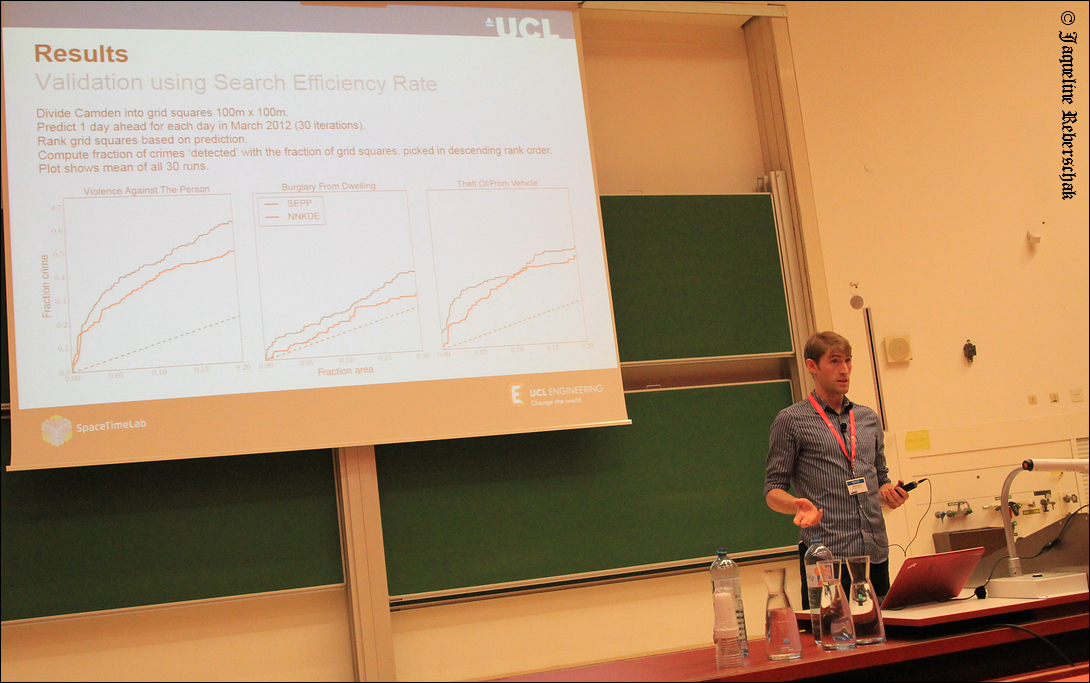2016
Cheng, T. (2016). CPC: crime, policing & citizenship – overview. CPC Closing Workshop (London, UK).
Davies, T.P., & Kowalska, K. (2016). Crime and deterrence on street networks. CPC Closing Workshop (London, UK).
Rosser, G. & Adepeju, M. (2016). Network-based crime prediction. CPC Closing Workshop (London, UK).
Williams, D., Gale, C. & Skarlatidou, A. (2016). Public attitudes toward policing. CPC Closing Workshop (London, UK).
Chen, H. & Wise, S. (2016). Intelligent patrolling . CPC Closing Workshop (London, UK).
Adepeju, M. & Rosser, G. (2016). Evaluating Crime Prediction Maps. CPC Closing Workshop (London, UK).
Shen, J. (2016). Analysing police activities and behaviours. CPC Closing Workshop (London, UK).
Stringer, D. (2016). Community Engagement & Confidence. CPC Closing Workshop (London, UK).
2015
Adepeju, M., & Cheng, T (2015). Detection of Emerging Hot-Routes for Proactive Policing using Space-Time Scan Statistics (STSS). Association of American Geographers Annual Meeting (Chicago, IL).
Adepeju, M., Cheng, T., Shawe-Taylor, J., & Bowers, K. (2015) A new metric of crime hotspots for operational Policing. GISRUK 2015 Conference (Leeds, UK).
Cheng, T. (2015) Spatio-temporal Analytics for Total Policing. UK Knowledge Transfer Network Workshop: Digital Forensics and Big Data: Extracting Actionable Information.
Cheng, T. (2015) Workshop – Research of highlights of Geospatial Data Processing and Big Data. GeoBusiness
Cheng, T. (2015) Panel debate on the talent gap for data skills – Hunting Data Science Unicorns. Digital Shoreditch.
Davies, T.P. (2015). Examining crime clustering via network motif analysis. International Conference on Computational Social Science, Helsinki, Finland, June 2015. Poster presentation.
Davies, T.P. (2015). Street network effects in the analysis and modelling of urban crime. Networks and Criminality Workshop, Oxford, UK, April 2015. Invited talk.
Davies, T. & Bowers, K. (2015) Quantifying the deterrent effect of police patrol via GPS analysis. GISRUK 2015 Conference (Leeds, UK).
Davies, T.P. & Bowers, K.J. (2015). Quantifying the deterrent effect of police patrol. International Symposium on Environmental Criminology and Crime Analysis, Christchurch, New Zealand, June 2015.
Davies, T.P. & Bowers, K.J. (2015). Street network effects in crime and policing. International Crime and Policing Conference, London, UK, January 2015. Poster presentation.
Gale, C. (2015). Using geodemographics to profile public confidence in the Metropolitan Police Service. Geospatial and Big Data seminar, UCL, London, UK, February 2015.
Kowalska, K., Shawe-Taylor, J., & Longley, P. (2015) Data-driven modelling of police patrol activity. Association of American Geographers Annual Meeting (Chicago, IL).
Kowalska, K., Shawe-Taylor, J., & Longley, P. (2015) Data-driven modelling of police route choice. GISRUK 2015 Conference (Leeds, UK).
Lai, J., Cheng, T., & Lansley, G. (2015) Spatio-Temporal Patterns of Passengers’ Interests at London Tube Stations. Association of American Geographers Annual Meeting (Chicago, IL).
Lai, J., Cheng, T., & Lansley, G. (2015) Spatio-Temporal Patterns of Passengers’ Interests at London Tube Stations. GISRUK 2015 Conference (Leeds, UK).
Rosser, G. & Cheng, T. (2015) A self-exciting point process model for predictive policing: implementation and evaluation. GISRUK 2015 Conference (Leeds, UK).
Rosser, G., Davies, T. & Cheng, T. (2015). Self-exciting network-constrained point process modelling for crime prediction. International Conference on Computational Social Science (Helsinki, Finland).
Shen, J. (2015). London Police Foot Patrol Pattern Analysis. Geospatial and Big Data seminar, UCL, London, UK, February 2015.
Shen, J. & Cheng, T. (2015) Clustering Analysis of London Police Foot Patrol Behaviour from Raw Trajectories. 13th International Conference on GeoComputation (Richardson, TX).
Shen, J. & Cheng, T. (2015) Group Behaviour Analysis of London Foot Patrol Police. GISRUK 2015 Conference (Leeds, UK).
Williams, D. (2015). Modeling public confidence in the Met Police. Geospatial and Big Data seminar, UCL, London, UK, February 2015.
Williams, D., Haworth, J., & Cheng, T. (2015) Exploratory spatiotemporal data analysis of public confidence in the police in London. GISRUK 2015 Conference (Leeds, UK).
Wise, S. (2015). Spatially Explicit Agent-based Modelling. Geospatial and Big Data seminar, UCL, London, UK, January 2015.
Wise, S. & Cheng, T. (2015) A Model Officer: An Agent-based Model of Policing. GISRUK 2015 Conference (Leeds, UK).
2014
Adepeju, M., Cheng, T., & Nakaya, T. (2014). Detection of Space-Time Crime Patterns for Predictive Policing. Association of American Geographers Annual Meeting (Tampa, FL).
Adepeju, M. & Cheng, T. (2014). Prospective Space-Time Scan Statistics (STSS) for Crime Prediction. In 22nd Annual Popfest conference, London, UK, August, 2014.
Davies, T.P. (2014). Incorporating street network effects in models of crime. Computational Social Science Conference, Warwick, UK, June 2014. Invited talk.
Davies, T.P. (2014). Incorporating street network effects in models of crime. Mathematical Models for Social Sciences, Paris, France, December 2014. Invited talk.
Davies, T.P. & Bowers, K.J. (2014). Street network effects in crime and policing. International Crime Science Conference, London, UK, July 2014.
Davies, T.P. & Bowers, K.J. (2014). Quantifying the relationship between urban form, crime and police activity. American Society of Criminology Annual Meeting (San Francisco, CA).
Kowalska, K., Longley, P., & Shawe-Taylor, J. (2014) What Makes Police Stop? – Analysis of Spatial Attributes Correlated to Frequent Police Patrol Visits. Association of American Geographers Annual Meeting (Tampa, Florida).
Rosser, G. (2014). Modelling spatiotemporal crime patterns for predictive policing: ‘crimes as earthquakes’ model. Geospatial and Big Data seminar, UCL, London, UK, October 2014.
Rosser, G. & Cheng, T. (2014). Self-exciting point process models of spatiotemporal crime patterns. International Crime Science Conference, London, UK, July 2014.
Rosser, G. & Cheng, T. (2014). Point process models for prospective crime analysis. GIScience 2014 (Vienna, Austria).
Older
Adepeju, M. & Cheng, T. (2013). Implications of the difference between the Prospective and Retrospective Space-time scan statistics.European Colloquium of Theoretica & Quantitative Geography (Dourdan, France).

